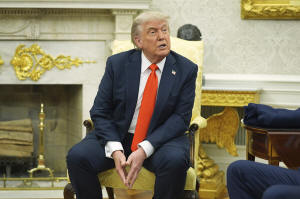Trump says after Xi call that US and China will resume trade talks
[June 06, 2025] By
CHRIS MEGERIAN, DIDI TANG and WILL WEISSERT
WASHINGTON (AP) — President Donald Trump said Thursday that his first
call with Chinese leader Xi Jinping since returning to office was “very
positive,” announcing that the two countries will hold trade talks in
hopes of breaking an impasse over tariffs and global supplies of rare
earth minerals.
"Our respective teams will be meeting shortly at a location to be
determined," Trump wrote on his social media platform after the call,
which he said lasted an hour and a half.
Treasury Secretary Scott Bessent, Commerce Secretary Howard Lutnick and
U.S. Trade Representative Jamieson Greer will represent the U.S. side in
negotiations.
The Republican president, who returned to the White House for a second
term in January, also said Xi “graciously” invited him and first lady
Melania Trump to China, and Trump reciprocated with his own invitation
for Xi to visit the United States.
The Chinese foreign ministry said Trump initiated the call between the
leaders of the world's two biggest economies.
The ministry said in a statement that Xi asked Trump to “remove the
negative measures” that the U.S. has taken against China. It also said
that Trump said “the U.S. loves to have Chinese students coming to study
in America,” although his administration has vowed to revoke some of
their visas.
Comparing the bilateral relationship to a ship, Xi told Trump that the
two sides need to “take the helm and set the right course” and to “steer
clear of the various disturbances and disruptions," according to the
ministry statement.
Trump had declared one day earlier that it was difficult to reach a deal
with Xi.

“I like President XI of China, always have, and always will, but he is
VERY TOUGH, AND EXTREMELY HARD TO MAKE A DEAL WITH!!!" Trump posted
Wednesday on his social media site.
Craig Singleton, senior director of China program at the Foundation for
Defense of Democracies, said the phone call “simply paused escalation on
trade” but “didn't resolve core tensions” in the bilateral relations.
With the White House still weighing more punitive measures, the current
calm could be upended as Beijing also is prepared to fight back the
moment Washington escalates, Singleton said. “We’re likely one
competitive action away from further confrontation,” Singleton said.
In his note, Gabriel Wildau, managing director at the consultancy Teneo,
wrote that the phone call “prevented derailment of trade talks but
produced no clear breakthroughs on key issues.”
Trade negotiations between the United States and China stalled shortly
after a May 12 agreement between the two countries to reduce their
tariff rates while talks played out. Behind the gridlock has been the
continued competition for an economic edge.
[to top of second column] |

President Donald Trump speaks during a meeting with Germany's
Chancellor Friedrich Merz in the Oval Office of the White House,
Thursday, June 5, 2025, in Washington. (AP Photo/Evan Vucci)
 The U.S. accuses China of not
exporting critical minerals, and the Chinese government objects to
America restricting its sale of advanced chips and its access to
student visas for college and graduate students.
Trump has lowered his 145% tariffs on Chinese goods to 30% for 90
days to allow for talks. China also reduced its taxes on U.S. goods
from 125% to 10%. The back and forth has caused sharp swings in
global markets and threatens to hamper trade between the two
countries.
Treasury Secretary Scott Bessent had suggested that only a
conversation between Trump and Xi could resolve these differences so
that talks could restart in earnest. The underlying tension between
the two countries may still persist, though.
During the call, Xi said the Chinese side is sincere about
negotiating and “at the same time has its principles,” and the
Chinese president said “the Chinese always honor and deliver what
has been promised,” according to the Chinese foreign ministry.
Even if negotiations resume, Trump wants to lessen America’s
reliance on Chinese factories and reindustrialize the U.S., whereas
China wants the ability to continue its push into technologies such
as electric vehicles and artificial intelligence that could be
crucial to securing its economic future.
The United States ran a trade imbalance of $295 billion with China
in 2024, according to the Census Bureau. While the Chinese
government’s focus on manufacturing has turned it into a major
economic and geopolitical power, China has been muddling through a
slowing economy after a real estate crisis and coronavirus pandemic
lockdowns weakened consumer spending.
Trump and Xi last spoke in January, three days before Inauguration
Day. The pair discussed trade then, as well as Trump’s demands that
China do more to prevent the synthetic opioid fentanyl from entering
the United States.
Despite long expressing optimism about the prospects for a major
deal, Trump became more pessimistic recently.
“The bad news is that China, perhaps not surprisingly to some, HAS
TOTALLY VIOLATED ITS AGREEMENT WITH US,” Trump posted last week. “So
much for being Mr. NICE GUY!”
All contents © copyright 2025 Associated Press. All rights reserved
 |